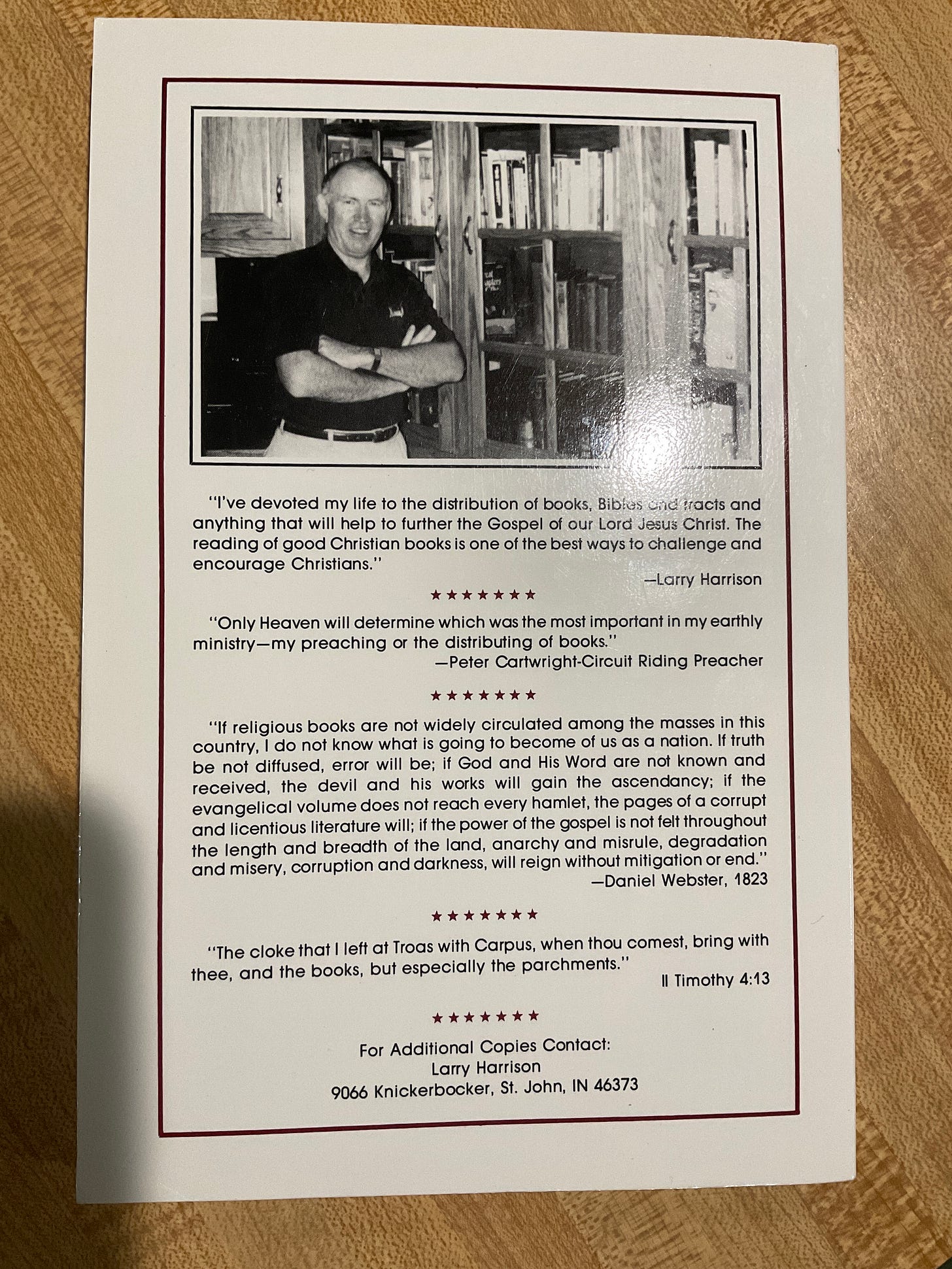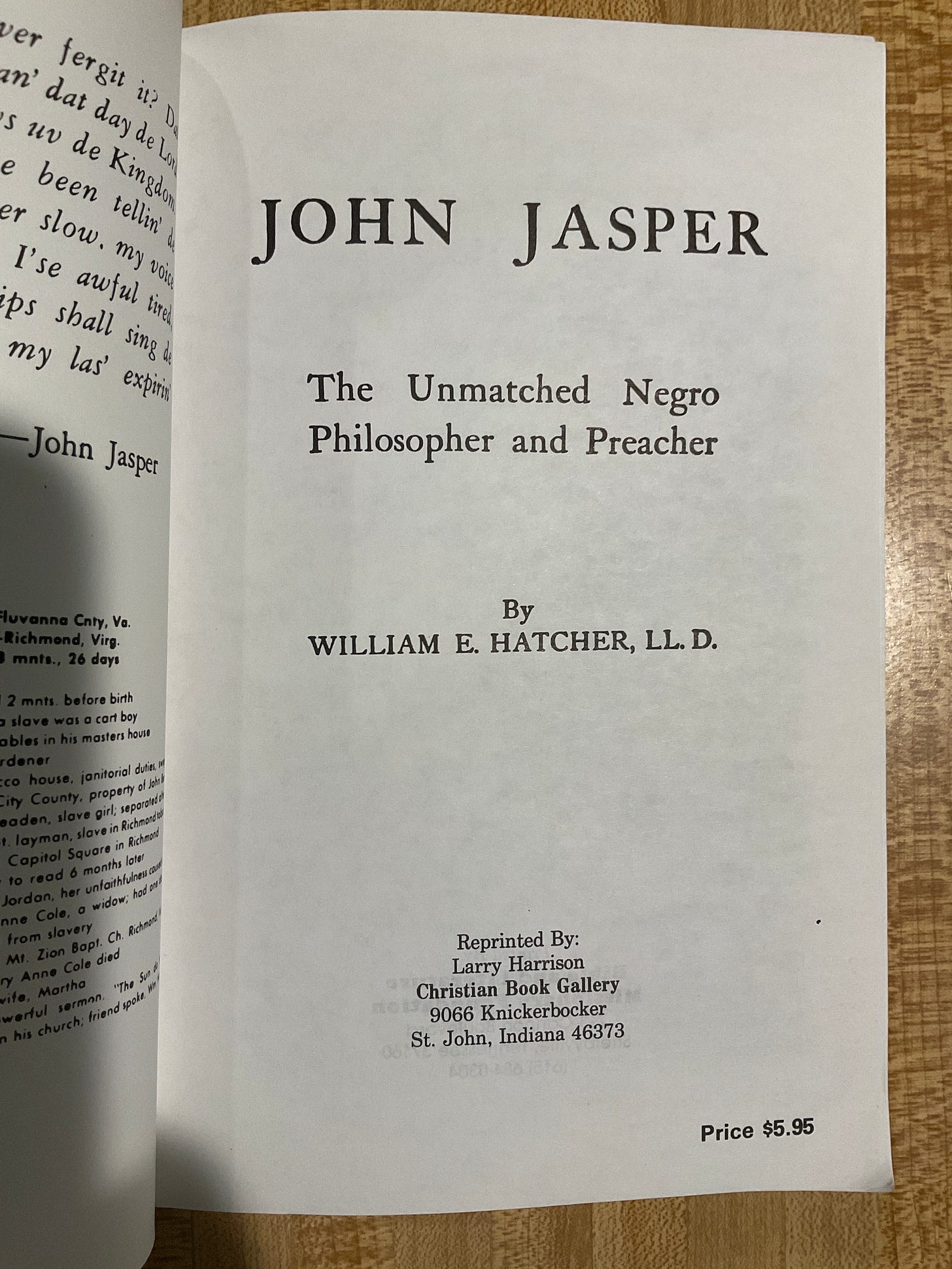Book Review: “John Jasper: The Unmatched Negro Philosopher and Preacher” by William E. Hatcher
If we went for a coffee today, perhaps we could talk about “John Jasper” by William E. Hatcher.
How did I get this book?
In the spring of 2022, my son and I were in Milbrook, Alabama to help my brother, my cousin and my aunt clean out my grandparents affects after they passed away. On the Wednesday night, we went to my grandparent’s church, Victory Baptist Church for their service. After the service, I perused their library and picked up three books. This was one of them. I wrote about another one, “Brother Sheffey” a couple of weeks later. The third is still on my shelf waiting for me to be interested in it and read it. There was no one available to receive my “donation.” This book was $5. If Brother Joey Byrd, who is the pastor, happens to come across this review, I’ll happily send him the money!
What is it about?
It’s the story of John Jasper, a man born into slavery in the Deep South who became a very, very, very popular preacher after Emancipation in Richmond, Virginia.
It’s a brief biography. At it’s reprinting, no further historical work has been done on his life, so, this serves as the main source of information of his life. He had a dramatic conversion in his mid-20’s while still a slave. Almost immediately he became a preacher and seemingly took every opportunity to preach he could before Emancipation. Afterwards, he founded a church in Richmond Virginia that he pastored for decades.
One of the most interesting aspects of this book is that it gives an unvarnished account of slavery and into the culture therein of those final decades. So often we hear summaries, and this gives specifics. For instance, his master, Sam Hargrove was instrumental in John’s conversion. John attributes his call to preach to “Mars Sam Hargrove.” Furthermore, his father died before he was born. He was his mother’s 24th child. He married three times. His first wife was sold away and he never saw her again. In addition, there are details given to the rituals they had around funerals, as they furnished most of the opportunities John was given to preach and hone his craft.
This is from page 37:
A funeral to them was a pageant. It was a thing to be arranged for a long time ahead. It was to be marked by the gathering of the kindred and friends from far and wide. It was not satisfactory unless there was a feast and excitable crowd. It usually meant an all day meeting, and often a meeting in a grove, and it drew white and black alike, sometimes almost in equal numbers. Another demand in the case, —for the slaves knew how to make their demands,— was that the negro preacher “should preach the funeral,” as they called it. In things like this, the wishes of the slaves generally prevailed. “The funeral” loomed up weeks in advance, and although marked by sable garments, mournful manners and sorrowful outcries, it had about it hints of an elaborate social function with festive accompaniments. There was much staked on the fame of the officiating brother. he must be one of their own colour, and a man of reputation. They must have a man to plough up their emotional depths, and they must have freedom to indulge the extravagancies of their sorrow. These demonstrations were their tribute to their dead and were expected to be fully adequate to do honour to the family.
It was in this way that Jasper’s fame began. At first, his tempestuous, ungrammatical eloquence was restricted to Richmond, and there it was hedged in with many humbling limitations. But gradually the news concerning this fiery and thrilling orator sifted itself into the country, and many invitations came for him to officiate at country funerals.
He was preeminately a funeral preacher. A negro funeral without an uproar, without shouts and groans, without fainting women and shouting men, without pictures of triumphant death beds and teh judgment day, and without the gates of heaven wide open and the subjects of the funeral dressed in white and rejoicing around the throne of the Lamb, was no funeral at all. Jasper was a master from the outset at this work.
One of the chapters is given completely to recording verbatim a message that John Jasper gave in his church in Richmond about the moving of the sun. He was an ardent believer that the sun was not stationary, but moved, and he would argue with anyone who said different.
Another chapter is the record of a white non-believing journalist who went to one of his church services and gives a riveting account of the experience. John Jasper captivated him in a similar way that George Whitfield famously captivated Benjamin Franklin.
What did I think?
There were two dominant thoughts as I read this book. First, I was stunned. Second, I was frustrated.
I was stunned because of what a huge impact this man had. It’s incredible to read of his background, upbringing, frustration against God, conversion, the peculiarities of slavery, the clear anointing on his life, how he learned to read, and then how the Lord used him over so many years. I marvelled at his heart for the Lord and then his absolute mastery over the art of public speaking. His technique of getting into the story and expressing every observation and feeling and sanctified imagination was inspiring. He was a free man.
It was also frustrating. Why have I never heard of this guy? What other preachers and ministers have I not heard of? Why hasn’t anyone done a proper history of his life? In our society, which is going through similar upheaval, we would benefit from the reminder of how the Lord has worked in the past, through men like John Jasper.
The other thing that was frustrating was that the quotes from John Jasper were spelled in a way to try to help the reader hear what he sounded like. It was frustrating because it was too much. I was grateful for a cleaned up copy of “The Sun Do Move” in the appendix portion of the book.
Conclusion:
My life is better after reading this. I’d love to visit Richmond and see where his church was. I learned more about American history reading this. I’d like to read the stories of more men like him. I know there has to be many, many more. I was inspired to preach and to consider a different style of conveying the truths of the Scriptures. It also made me marvel afresh at the Holy Spirit and his ability to work with and through ordinary people. And, we need more smaller publishers like Larry Harrison who will distribute unconventional but necessary works like these.
Have you heard of John Jasper? Larry Harrison? Or, are there other biographies of preachers from this time period you would suggest?
andy




